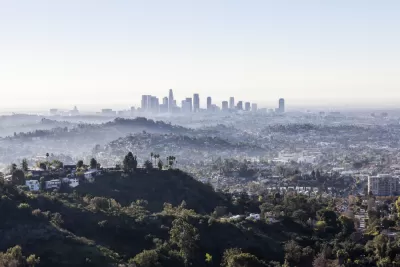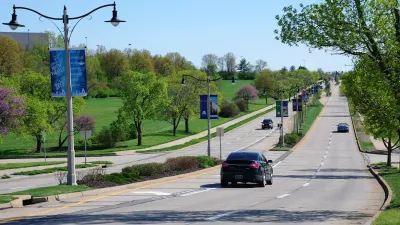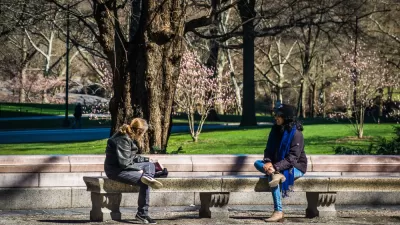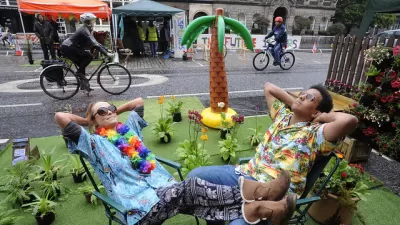Numerous writers and experts are already examining the question about what happens to ideas about urbanism in a future forever altered by recent events.

[Updated March 23] Questions about the future are obviously on everyone’s mind as the coronavirus pandemic sweeps the globe, shutting down cities and states across the United States after months of warnings about the risk from Asia and Europe, and models of both success and failure in containing the spread of the coronavirus. Confined to the relatively small spaces of homes and apartments, surrounded by immense cities and regions, questions about whether living arrangements and development patterns are resilient and safe enough take on new meaning during a pandemic, and new anxieties.
As news continues to break and the situation continues to change, the media will continue to debate the lessons of the pandemic, including ideas about urbanism. Some of the leading voices in urbanism, planning, and design media are already attempting to reconfigure a vision for the future of cities, now that the coronavirus has revealed so much about the ways we live.
For those who are ready to also ponder these questions, here is a roundup of articles—of varying levels of optimism, speculation, and “newsiness”—on the changes that are already underway in cities, and what we can expect when the pandemic is over.
- "Pandemics Are Also an Urban Planning Problem" (CityLab, March 6)
- "Coronavirus outbreak's silver lining for climate crisis likely to fade" (The Japan Times, March 12)
- "Are Suburbs Safer From Coronavirus? Probably Not." (CityLab, March 13)
- "Social distancing revives America's suburban instincts" (The Boston Globe, March 16)
- "Why Chicago and other cities are vulnerable to the virus: Their strength is their weakness" (Chicago Tribune, March 17)
- "Why Norway Is Banning its Residents From Their Own Vacation Homes" (CityLab, March 17)
- "Can City Life Survive Coronavirus?" (New York Times, March 17)
- "Philadelphia has endured plagues before. It adapted and became a better place." (Philadelphia Inquirer, March 18)
- "Building a future in a corona paralysis" (CNU Public Square, March 18)
- "COVID-19 may sport the thinnest silver lining: a cleaner climate" (Smart Cities Dive, March 19)
- "The new coronavirus economy: A gigantic experiment reshaping how we work and live" (The Washington Post, March 21)
- "Will coronavirus spur a traffic-solving remote-work revolution? Don’t count on it" (Mercury News, March 22)
These kinds of questions serve as context for massive challenges facing communities as the worst effects of the pandemic start to show in hospitals and unemployment numbers over the coming days and weeks, but the connections between the traditional role of planning and the future of planning to the sustainability of public health and prosperity are obvious now, more than ever. Planners will be essential in the hard work of answering questions about the public realm, mobility, social isolation, and local and regional leadership. Now, soon, and for the long-term.
[Please share your ideas about how planning and the future of cities will change as a result of COVID-19 in the comments below, or by sending a pitch to Planetizen, at [email protected].]

Planetizen Federal Action Tracker
A weekly monitor of how Trump’s orders and actions are impacting planners and planning in America.

USGS Water Science Centers Targeted for Closure
If their work is suspended, states could lose a valuable resource for monitoring, understanding, and managing water resources.

End Human Sacrifices to the Demanding Gods of Automobile Dependency and Sprawl
The U.S. has much higher traffic fatality rates than peer countries due to automobile dependency and sprawl. Better planning can reduce these human sacrifices.

Seattle Transit Asked to Clarify Pet Policy
A major dog park near a new light rail stop is prompting calls to update and clarify rules for bringing pets on Seattle-area transit systems.

Oregon Bill Would End Bans on Manufactured Housing
The bill would prevent new developments from prohibiting mobile homes and modular housing.

Nashville Doesn’t Renew Bike Share Contract, Citing Lost Federal Funding
The city’s bike share system, operated by BCycle, could stop operating if the city doesn’t find a new source of funding.
Urban Design for Planners 1: Software Tools
This six-course series explores essential urban design concepts using open source software and equips planners with the tools they need to participate fully in the urban design process.
Planning for Universal Design
Learn the tools for implementing Universal Design in planning regulations.
Tyler Technologies
New York City School Construction Authority
Village of Glen Ellyn
Transportation Research & Education Center (TREC) at Portland State University
Chaddick Institute at DePaul University
Institute for Housing and Urban Development Studies (IHS)
Regional Transportation Commission of Southern Nevada
Toledo-Lucas County Plan Commissions






























